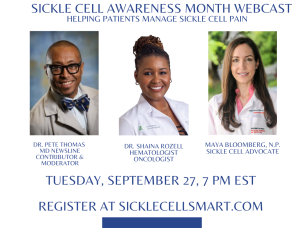Sickle Cell Smart
Digital Pain Self-Management Use Among Sickle Cell Patients and Caregivers
iCanCope is a digital pain self-management platform that helps patients and caregivers easily manage pain episodes. It has been shown to help reduce the frequency and severity of SCD pain episodes. In addition, it can also help improve the quality of life for both patients and caregivers. Sickle cell disease (SCD) is a group of...
The Latest in Sickle Cell Disease Treatment
Advancements in genomics research have opened up new avenues of treatments for sickle cell disease. This article highlights some of the most promising innovative approaches. Sickle cell disease is a group of inherited blood disorders, the most commonly known of which is sickle cell anemia. The disease is caused by an amino acid substitution at...
Sickle Cell Disease: Socio-Environmental Barriers to Care
Sickle cell disease is a complex and difficult condition to manage. A recent study has identified several socio-economic barriers that add to the clinical challenges of sickle cell disease, impeding timely and effective care and driving up healthcare costs. Introduction Sickle cell disease (SCD) is often associated with complications that lead to higher than normal...
Optimization for Sickle Cell Disease Before Surgery
Sickle cell anemia is a condition that is often underrecognized before surgery. As it stands, sickle cell disease already affects certain groups of people disproportionately. Affected patients should be monitored for pain control during procedures Sickle cell disease (SCD) is a genetic disorder of the red blood cells (RBC). It is caused by a mutation...
Healing Social Disparities in Sickle Cell Disease
Sickle cell disease (SCD) is a commonly inherited disorder that disproportionately affects the Black American population. A cure would have a significant impact on the financial burden Black Americans with SCD face. Sickle cell disease (SCD) is one of the most common inherited blood disorders, affecting Black populations (1/365 births) more than any other groups....
Sickle Cell Webcast: Helping Patients Manage Sickle Cell Pain
MD Newsline hosted a webcast on September 27 titled Helping Patients Manage Sickle Cell Pain which featured Dr. Pete Thomas, Dr. Shaina Rozell, and Maya Bloomberg, N.P. Which covers complications of sickle cell and how to manage them effectively. To watch the webcast, please register using via image or link below. Sickle...
MoCA as a Cognitive Screening Tool in Sickle Cell Disease
Cognitive impairment in adults with sickle cell disease (SCD) poses a serious morbidity concern. Routine cognitive screening is encouraged by guidelines; however, no screening method has been shown effective in the population. The Montreal Cognitive Assessment (MoCA) was investigated as a potential screening tool for SCD. Researchers tested people with SCD on the MoCA, the...
Sickle Cell Webcast: Breakthroughs in Sickle Cell Treatment & Management
On June 27 MD Newsline hosted a sickle cell webcast featuring De. Cheryl Mensah and Dr. Krystal Preston moderated by Dr. Pete Thomas entitled “Breakthroughs in Sickle Cell Treatment & Management”. This webcast was sponsored by Oxbryta and Global Blood Therapeutics. Register via the image or link below to view the webcast. Sickle Cell Webcast...
Screening Kids With Sickle Cell Disease for Neurocognitive Difficulty
Many pediatric patients with sickle cell disease (SCD) struggle with neurocognitive and academic difficulties and do not receive proper educational and therapeutic support for these issues. As a result, it is vital that these patients are identified and referred for appropriate care. This article, published in Clinical Practice in Pediatric Psychology, analyzes referrals made in a...
More Medical News














